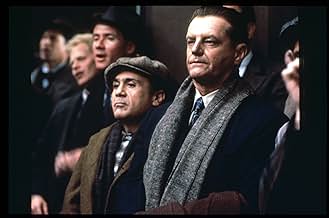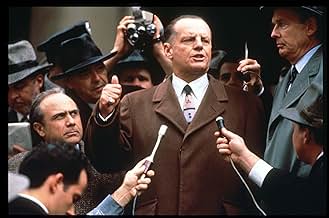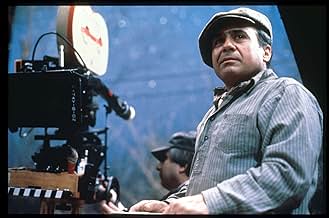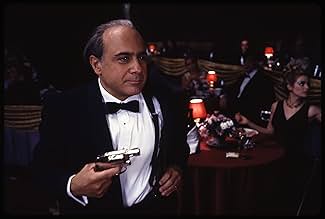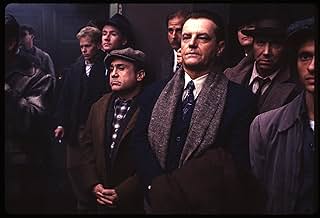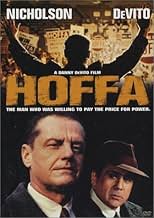Hoffa
- 1992
- Tous publics
- 2h 20min
Le récit du célèbre syndicaliste américain, Jimmy Hoffa, qui organisa une grève farouche, conclut un accord avec une organisation criminelle et disparut mystérieusement en 1975.Le récit du célèbre syndicaliste américain, Jimmy Hoffa, qui organisa une grève farouche, conclut un accord avec une organisation criminelle et disparut mystérieusement en 1975.Le récit du célèbre syndicaliste américain, Jimmy Hoffa, qui organisa une grève farouche, conclut un accord avec une organisation criminelle et disparut mystérieusement en 1975.
- Nommé pour 2 Oscars
- 2 victoires et 6 nominations au total
- Loading Foreman
- (as Joe V. Greco)
Avis à la une
In ten years, this film will be a classic!
Unfortunately, the film is an inadequate showcase for Nicholson's talents. The story begins in 1975 on what presumably was the last day of Hoffa's life as he and his pal Bobby Ciaro (Danny DeVito) wait for some people to show up for a meeting at a Michigan roadhouse. They wait a long time which allows Bobby to recall many incidents in Hoffa's extraordinary career as a union organizer.
There are two problems with this. First Bobby, who's supposed to be something of an enforcer, is never credible. Although he's nearly always in view, he never seems to belong. Perhaps that's because he's entirely a creation of screenwriter David Mamet. Barely adequate as a story-telling device, Bobby's unfortunate insertion gives rise to the inevitable, more serious question: how much of this story is true?
If you accept Mamet's interpretation, Hoffa was a victim of a trusted associate, the Government, and the Mob, but foremost a hero because he fought for the working man. Fair enough. But when you watch "Hoffa" you don't really get a clear sense of why all this was so. Motivations are largely absent. The flashbacks pass by but you feel these are merely sketches or outlines, often presented without clear context. Some are believable, others seem to be mere speculation, still others, such as the scenes with Robert Prosky or the enormous riot sequence, implausible. Was Prosky's character real? Did so many people actually die? Ask Bobby, because in many ways it's as much his story as Hoffa's; but as we know, Bobby is pure fiction.
Mamet has been quoted as saying audiences look more for drama than for information. Fine, and who'd want to see Ken Burns' take on the Teamsters. But "Hoffa", for all its huffing and puffing, lacks the drama of Paul Schrader's "Blue Collar" or the better Mob pictures.
Recommended solely for Nicholson's performance.
Mamet's Hoffa knows the Kennedy family built their fortune out of rum running to a large extent, and he sees no difference between their corruption and his own compromises. At least, Hoffa tells himself, his own deals with the devil serve something larger then his immediate family, they serve the membership of the union. And this was very true, which is why a fair number of Teamsters still swear by the name Jimmy Hoffa. Nicholson's snide asides to his "betters" completely captures the class war basis that motivated the actual man's actions. Anyone who has been through an actual labor dispute and has been witness to the patronizing communications that come through a company eager to crush a union effort knows full well what fired up Jimmy Hoffa, even as we turn aside from the path he took.
The film succeeds because De Vito, Nicholson and Mamet understand what pushed the labor movement forward, and they understand its contradictions. Most important, they understand why those contradictions overwhelmed a man as gifted as Jimmy Hoffa, and this is what makes it better then your average Hollywood drama about labor. Hoffa is a film about working class attitude that gets beneath the usual dismissals of working class concerns, and as such, deserves respect. The powers that be have every legend about their leadership. It's time the working class was allowed legends about its own once again, provided we understand that they are legends, and therefore laden with much myth. The very real larger then life qualities of Jimmy Hoffa, however, make this a film worth more then one critical glance.
Le saviez-vous
- AnecdotesThe only major make-up Jack Nicholson had to wear to become Jimmy Hoffa was fake nose and a set of false upper teeth (as seen in the behind-the-scenes footage on the DVD).
- GaffesWhen Jimmy and Billy torch bomb the building, they create a blast so intense, it blows out the passenger side window on Bobby's truck. Yet in the following shots, the window goes from being intact, to being shattered.
- Citations
Jimmy Hoffa: If a guy's close to you, you can't slight 'im. You can't slight that guy. A real grievance can be resolved; differences can be resolved. But an imaginary hurt, a slight - that motherfucker gonna hate you 'til the day he dies.
- Crédits fousthere are no opening credits and the title of the film at the beginning.
- Versions alternativesOn a special laserdisc edition, Danny DeVito hosts a supplemental portion of the disc with outtakes, including a scene where Hoffa perfectly shoots a beer bottle with a rifle.
- Bandes originalesLet's Make Love Tonight
Written, Produced and Performed by Nicky Addeo
Meilleurs choix
- How long is Hoffa?Alimenté par Alexa
Détails
Box-office
- Budget
- 35 000 000 $US (estimé)
- Montant brut aux États-Unis et au Canada
- 24 276 506 $US
- Week-end de sortie aux États-Unis et au Canada
- 6 406 012 $US
- 27 déc. 1992
- Montant brut mondial
- 29 302 121 $US
- Durée
- 2h 20min(140 min)
- Couleur
- Rapport de forme
- 2.39 : 1



